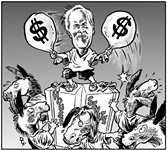Playing Defense
Progressives prepare to circle the wagons at the Lege
By Michael King, Fri., Nov. 29, 2002
Like many a former pol, Maxey is moving to the lobby, although he hopes to continue his advocacy on behalf of public health, environmental protection, human rights, and the basketful of progressive causes he defended on the House floor. Considering how flagrantly the corporate lobby is now rising in the ranks of GOP governance -- Gov. Perry, Speaker Craddick, and Lt. Gov. David Dewhurst are all reaching directly into the business lobby for staff -- Maxey may be in a better position to watch how corporate whims become law than he was from within the House ropes.
But Maxey points out that the challenge for the GOP will be in matching their fire-breathing rhetoric to the "harsh reality of governing" a state in crisis. "In order to balance the budget," he said, "they're either going to have to raise taxes or else slash state services in a really draconian way. And to do that, they'll have to attack a lot of vulnerable people -- because there's no place else to look for money that's not there, except in human services or public education."
Look Out, Mississippi
Dist. 49 Rep. Elliott Naishtat remains on the playing field and has more than once sardonically remarked that the Texas Legislature has always been a very conservative body that now merely has (many) more Republicans in it. He acknowledges that progressive legislators -- including the core of Democrats who remained loyal to Laney -- are now in even more of a "defensive mode" than in recent years. Naishtat will certainly have to relinquish, for example, his chairmanship of the House Human Services Committee, perhaps to one of the Craddick-crats or an even more conservative Republican like Kerrville's Harvey Hilderbran or Burleson's Arlene Wohlgemuth, both long averse to sustaining such health care entitlements as Medicaid. For anyone who might believe the first job of health care policy is to protect the health of citizens -- and not the bottom line of insurance companies, HMOs, or nursing homes -- it's not a happy prospect.
"If I'm not reappointed [as chair]," said Naishtat, "I'll remain the same outspoken advocate for health and human services and for addressing the needs of all vulnerable populations. I'll be wearing a different hat, but I'll be just as involved in the battle for state services as I have been since I began many years ago as a VISTA volunteer."
Naishtat is also concerned that the GOP majority will be determined to "balance the budget on the backs of poor people and children, by cutting programs like children's health insurance, temporary assistance to needy families, and Medicaid." He expects budget-cutting efforts to undo Medicaid simplification and C.H.I.P. (two sessions ago, Gov. Bush only reluctantly agreed to accept C.H.I.P. coverage for kids within 200% of the poverty line) -- in other words, rationing health care by restricting public access. He also expects moves toward "family caps" on total assistance as well as "full family sanctions" -- that is, withdrawing assistance from children whose parents have run afoul of state law.
"They can't save much money that way," Naishtat added. "We're already almost at the bottom of the national ladder in social services -- will they want to drop below Mississippi?"
Rob Peter -- Then Rob Paul
Indeed, as Anne Dunkelberg of the Center for Public Policy Priorities points out, not only will the state not save much money by slashing human services, it will lose money. "The No. 1 source of federal funds to Texas is Medicaid, at approximately $15 billion annually. The next is federal highway funding, which is not even close -- $4.5 billion. That Medicaid money is matching money, at $1.50 for every $1 in state funds. So every state dollar cut from Medicaid means $1.50 lost in federal matching funds. Those kinds of cuts just aren't sustainable." Moreover, she pointed out, state cuts in health care or education don't save real money -- they simply shift the costs to local property-tax payers. Dunkelberg also argues that there are plenty of Republican moderates who have always worked constructively on these issues and that progressives need to organize a unified front to "find additional revenue" to protect state services.
From a broader perspective, Tom "Smitty" Smith of Texas Public Citizen acknowledged that with many new committee chairs as well as members in the Lege, "it will be much more difficult to make forward progress, and on many issues we may go backward. We may see higher insurance rates, higher utility rates, more difficulty for injured citizens to get a day in court, increases in pollution. ..." Yet Smith says Public Citizen intends to press on with a major ethics reform initiative and also hopes to push hard on renewable energy. "Gov. Perry said he wants Texas to become the largest market for renewable energy," Smitty said. "We intend to hold him to that pledge."
Smith is not terribly optimistic about the session and notes that the ideological shift in the November election was "pretty strong -- we'll be looking hard for new allies to replace those who were defeated." Optimistic by profession, he's also clear-eyed. With cheerful resignation, he recalled an old Capitol saying: "Nobody's life, liberty, or happiness is safe when the Lege is in session." ![]()
Got something to say on the subject? Send a letter to the editor.








